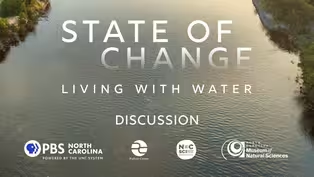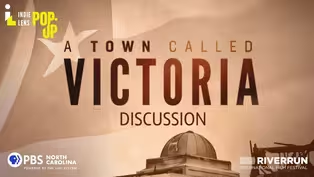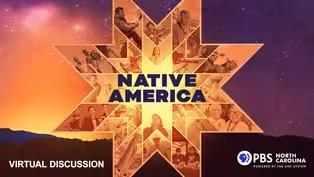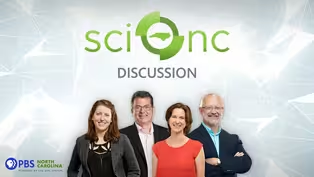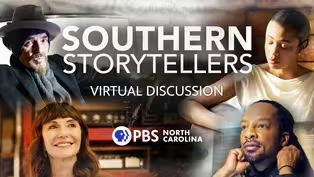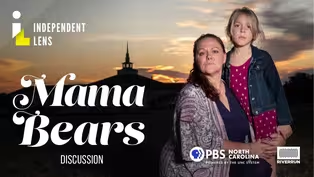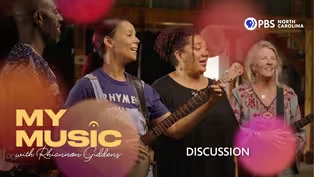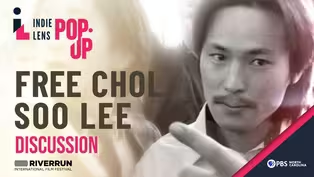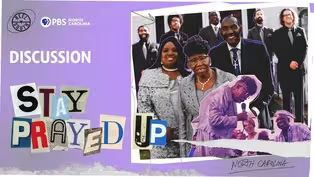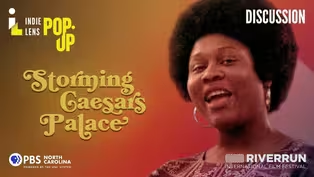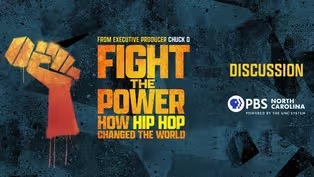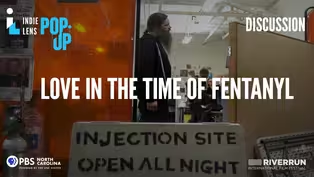PBS North Carolina Specials
Discussion | PBS NC Celebrates Pride Month with Prideland
6/1/2021 | 50m 18sVideo has Closed Captions
PBS NC CEO Lindsay Bierman discusses faith, education and politics with LGBTQ+ leaders.
Following a special screening of Prideland, Rev. Debra T. Hopkins, Durham Public Schools principal, Ignite! Academy, Matt Hickson and Rep. Vernetta Alston share their work, perspectives, and experiences with PBS NC CEO Lindsay Bierman. Resources, bills, laws, school policy, volunteer opportunities and more are discussed.
Problems playing video? | Closed Captioning Feedback
Problems playing video? | Closed Captioning Feedback
PBS North Carolina Specials is a local public television program presented by PBS NC
PBS North Carolina Specials
Discussion | PBS NC Celebrates Pride Month with Prideland
6/1/2021 | 50m 18sVideo has Closed Captions
Following a special screening of Prideland, Rev. Debra T. Hopkins, Durham Public Schools principal, Ignite! Academy, Matt Hickson and Rep. Vernetta Alston share their work, perspectives, and experiences with PBS NC CEO Lindsay Bierman. Resources, bills, laws, school policy, volunteer opportunities and more are discussed.
Problems playing video? | Closed Captioning Feedback
How to Watch PBS North Carolina Specials
PBS North Carolina Specials is available to stream on pbs.org and the free PBS App, available on iPhone, Apple TV, Android TV, Android smartphones, Amazon Fire TV, Amazon Fire Tablet, Roku, Samsung Smart TV, and Vizio.
Providing Support for PBS.org
Learn Moreabout PBS online sponsorshipMore from This Collection
Recordings of previous virtual event discussions.
Discussion - State of Change: Living with Water
Video has Closed Captions
Panelists discuss resilient North Carolinians adapting to climate change. (28m 54s)
Discussion - A Town Called Victoria - Independent Lens
Video has Closed Captions
The filmmaker and former Victoria residents share their story. (46m 51s)
Discussion - Native America Season 2
Video has Closed Captions
Panelists discuss preserving the languages of Native American tribes. (39m 1s)
Video has Closed Captions
Sci NC executive producer and host, Frank Graff, chats about upcoming Season 6 of Sci NC. (26m 6s)
Discussion - Southern Storytellers
Video has Closed Captions
Author David Joy and others discuss storytelling and their new PBS series. (42m 13s)
Discussion - Mama Bears | Independent Lens
Video has Closed Captions
Producer and director Daresha Kyi discusses the film and LGBTQIA+ advocacy. (34m 41s)
Discussion - My Music with Rhiannon Giddens
Video has Closed Captions
Discussing the series with producers Will & Deni McIntyre and country artist Rissi Palmer. (39m 56s)
Discussion - Free Chol Soo Lee | Independent Lens
Video has Closed Captions
Local lawyers, professors and nonprofit leaders discuss wrongful convictions and reentry. (40m 44s)
Discussion - Stay Prayed Up, Reel South
Video has Closed Captions
The filmmakers discuss their journey with Mother Perry and The Branchettes. (45m 4s)
Discussion - Storming Caesars Palace | Independent Lens
Video has Closed Captions
Local professors and nonprofit leaders discuss welfare and the social safety net. (33m 2s)
Discussion - Fight the Power: How Hip Hop Changed the World
Video has Closed Captions
Local experts discuss the history of hip hop with PBS North Carolina. (59m 43s)
Discussion - Love in the Time of Fentanyl | Independent Lens
Video has Closed Captions
Local harm reductionists, therapists and others discuss the opioid crisis and more. (55m 44s)
Providing Support for PBS.org
Learn Moreabout PBS online sponsorship- Good evening, I'm Lindsay Bierman, the chief executive officer of PBS North Carolina.
And I'm delighted to host, and I have conversation about pride land, the PBS program you just watched and which if you're like me probably made you cry.
What a wonderful testament to the ways that LGBTQ Americans can live authentically.
and with pride in the modern south.
I have seen firsthand the struggle and the beauty of being true to oneself in the modern south.
I've lived in North Carolina, now for seven years, I moved here in 2014 to serve as chancellor at UNC School of the Arts in Winston-Salem.
And I've served in my current role since the summer of 2019.
Before joining the UNC system, I lived in Alabama for 17 years, where we started tonight's program.
And I moved there from the corner of Greenwich and Christopher Street in New York City's West Village.
So I have some experience myself with that struggle.
"Prideland" highlights so beautifully of the challenge each of us faces to live in a way that feels truly authentic and it shows the often painful and disproportionate the challenges for LGBTQ and intersectional communities.
It also speaks to the increasing difficulty to find space together, to honor and to respect each other's stories.
This has always been a challenge for LGBTQ communities in all of their diversity.
And that point is so clearly and movingly made in "Prideland."
In an increasingly partisan, hostile and polarized world and media environment.
It feels like shouting has supplanted the sharing of stories.
Almost everyone has something to say, but it seems that fewer and fewer people have the time to see or hear or honor the presence of difference.
Tonight, we come together to reflect on the enduring beauty of the struggle to live a life that is true to one's own self and convictions.
And I see it as our work at PBS NC.
I see our work at PBS NC as a call to beauty, because it is not just a question of being exposed to difference.
It is a question of seeing of what is beautifully enduring and distinctive about and common across each of our life stories.
And with that, I would like to introduce to you our special guests this evening.
They have long biographies and many accomplishments.
And I will say we have church schools and state represented on this virtual event this evening.
We have with us tonight, Reverend Debra Hopkins, who serves as the founding director of There's Still Hope, a nonprofit organization that helps provide temporary shelter in the Charlotte area for transgender adults and individuals who have experienced domestic violence.
She is an ordained nondenominational minister featured on "Proper Pronouns," which was the documentary that PBS NC broadcasted in November, 2020.
It is about four transgender ordained ministers in North Carolina, side note, there are 30 transgender ordained ministers in the United States and six of them are in North Carolina.
All of you will have access to stream the documentary during the month of June and that is for Passport members.
So that's my plug to join Passport, if you haven't already.
We also have with us this evening, Matthew Hickson, who is the principal of Ignite!
Online Academy, which is a part of the Durham Public School system.
It is the system's first full time virtual and blended schools serving students in grades K through 12.
Matthew is also the founder of Bull City Schools United, a project aimed at equipping teachers and students to create safer schools for LGBT students.
And lastly, we have a Representative Vernetta Alston, who is a member of the North Carolina House of Representatives from the 19th District, that is Durham.
She is an attorney, previously worked with the North Carolina Center for Death Penalty Litigation for over five years.
She has recently filed four bills to protect LGBTQ rights.
And I know we'll get a chance to talk about those tonight.
I'm gonna serve up a little bit of Brene brown realness for just a minute here and start with Debra and just ask authentically, how are you doing?
How are you doing with all of the seismic changes and transformation that we're facing in our nation at this moment?
Reverend you are muted.
I think you are muted.
- I don't know what happened.
But first, let me say Lindsay.
- There she is.
- I am so sorry, to the PBS family, PBS NC family, to you and to this distinguished individuals this panel, I wanna say, thank you.
Thank you for having us be a part of this wonderful conversation.
I am doing fabulous, stressed yes, but I am doing fabulous during this season.
It's the start of Pride season and I'm excited.
- So I have to ask, you know, as somebody who literally helps people restore their faith, you know, so many people in the LGBT community, you know, feel unwelcome in many mainstream faith communities.
And as we saw on "Prideland."
How do you assist or encourage members of the LGBTQ community to have faith, be faithful, find the right spiritual or religious organization, where they feel like they truly belong, no pressure?
[laughing] - Oh, absolutely.
In my lengthy career, I have lived upon the premise of walking by example, we walk the walk we talk.
And it's important, it's imperative that we do that.
And so as I meet each individual and whole conversations, a whole space with them, I try to do it through my example, the God that we serve is a God of an example, of love, hope and promise.
"Prideland" really exemplify that through the stories that we're told by several individuals from the film, that really in order for our communities to change and for those within the LGBT community of faith, who truly wanna find a safe space, a place where they can express their love to God or the creator and however they see the creator, needs to find people like myself, who's one, affirming, one that exemplifies through my actions, through my attitude, through my behavior and the way I carry myself inside, try to do so by living the life, by walking the walk I talk.
- Thank you.
You are so inspiring.
Aand I know you were a motivational speaker and you were very motivating.
So thank you.
Matthew, let's go to you next.
First, how are you really doing?
And then second, as the founder of Bull City Schools United, can you tell the audience of the inspiration behind the project and a little bit more about the work that you do there?
And I have follow up question to that, which I'll go ahead and if you can hold all of this.
It's amazing to me that you're able to get done what you have gotten done within the operating environment, that's very complex, it's very bureaucratic, you know, particularly within the confines of the constraints of school policy in a public school system.
You know, I'd love to and I think the audience would love to hear more about how you get it all done.
- Thank you and first I just wanna express my first feeling that I thought of is gratitude to be here with Representative Alston and Reverend Hopkins.
So thanks to both of you and Lindsay to you also for moderating.
I'm also feeling really challenged.
We live in a state where our state legislature, Representative Alston, not included, likes to attack educators.
And I think we've seen, especially educators that are willing to, as I believe and I hope be an advocate at the same time as you're an educator.
And I think those things in the best circumstances are synonymous and in our state currently, there are definitely not, because of the legislature and some of the things that are happening in Raleigh.
And so I think I feel challenged.
So I'll go back a little bit to talk about the inspiration for the project and what we've done with Bull City Schools United.
I was a public school student in North Carolina.
I went to public school in Charlotte, North Carolina and there I was known primarily as the captain of the football team and as an all county athlete.
And it was in gym class, actually, that this whole project of Bull City schools United started.
There was a classmate of mine who is celebrating the LGBTQ Day of Silence and was paraded by some of my other classmates, including some teammates.
And there were some things said that I won't repeat here, but I just remember looking around and thinking who will intervene.
I looked at my teammates and I looked at my coach, who was also my team and nothing.
And I looked within myself and nothing.
The weight of my own shame and my own closeting, my own identity kept me from speaking up for this student with whom I shared a great deal.
And so it was sort of that moment that drove me, not only to kind of have a severed relationship with football, but to look at my school and say, I don't believe this is a place that fundamentally believes in the humanity of every one of the students that go here.
And when I started teaching, I remembered that.
I looked around for moments where we could do better work to uplift important policies and practices that would acknowledge the humanity of our LGBTQ students.
And so Bull city Schools United was really started from there.
I worked together with some phenomenal, incredible teachers from a number of schools across Durham.
And we started the work, which now today has trained over 2000 educators, has advocated for a comprehensive transgender guidance for students in Durham public schools and has also advocated for our student climate survey to be disaggregated, so we can truly start to see the experiences of our LGBTQ youth as a way to go about starting to address them.
So I think that last answer, which was a little complicated and probably boring speaks to your third part of the question, which is how do you start to navigate some of these bureaucracies?
I think the answer is you gotta really look in the details and push practices and policies.
And so we've tried to do that with Bull City Schools United.
- Yeah.
Do they still play dodgeball in grade school?
'Cause that was probably, you know, in addition to the bullying and everything else that is still one of the single most traumatic experience, of just dodgeball was so awful growing up, but that's in the aside.
I actually wrote a story and read it to a crowd in New York, before I moved to Alabama that was very cathartic.
Representative Alston, all of us owe you just a huge.
We are so deeply grateful for the work that you do, you know, on behalf of all of us as a representative in the legislature, it's tough work.
I know you've, cosponsored four bills granting equal rights and protections for LGBTQ community in North Carolina.
What inspired these bills?
But I think we know what inspired these bills.
But if you could talk about from your perspective, you know, what do you want the audience to know about these bills and the work that you're doing?
- Sure, thanks, Lindsay.
And it's a pleasure to be here.
Thank you for hosting the event, thanks to PBS North Carolina, just for always being such a bedrock of our community.
And again, thank you to Matt and to Reverend Hopkins, it's an honor to be here with you and to have this conversation.
So, I mean, the inspiration for the bills are the need, I think first and foremost, to fight for support inclusive legislation and to make progress towards inclusion and fairness and equality in our state.
I think personally, you know, I take my representation, you know, as one of the five LGBTQ identified folks in the North Carolina House very seriously.
You know, it's an honor to serve in the House period.
But it feels like a real gift to be able to bring my own personal experience and, you know, my affiliation with this community to the conversation in the general assembly.
And so in part it feels like a responsibility that I have personally,?
I think filing these bills puts pressure on all of our colleagues on both sides of the aisle to continue to think about these things and prioritize them and to honestly see where people stand.
And again, I think they were just the right thing to do.
And to your point, we filed the equality for all bill, which was a comprehensive non-discrimination bill that somewhat to the one that was followed in 2019.
I think particularly in the wake of, you know, really terrible legislation like HB2 at HB142, it's so important to continue to file that bill and hopefully get to the point where we respond to what North Carolinians want.
They want this bill to be passed.
You know, so many local communities have already taken step and people across North Carolina are already asking for this.
And so, you know, I think it's long past time that we pass this legislation.
And unfortunately, more of my colleagues in the House think otherwise than agree.
So we have not gotten there yet.
We also filed a bill to fully repeal HB2, 'cause while some of those provisions are now kind of a moot point, due the sunset of HB142 last December, we think it's important just to wipe it all off the books.
And we also filed bills to ban conversion therapy, which is a, you know, new horrifying practice and also a new bill or at least new in the last few years to prohibit gay and transgender defenses in the kind of cases that involve assaults and homicides.
So the folks can't claim a kind of gay and transgender panic as a defense to, you know, an assault or, you know, a crime that involves a personal injury.
So we thought that was an important one to push this year.
So happy to elaborate as much as you would like on this bill, but very excited to be a part of that knowledge relation.
- Thank you and thank you for the work that you're doing once again.
We'll definitely get to hear more about that.
I wanna into some of the questions we're getting from the audience.
So let me start.
I think this first question, probably, you all are free to jump in.
But I think this first question, probably I'm gonna suggest Reverend you address it.
We are empty nesters and we want to take in children and adolescents who have been rejected by and, or kicked out of their homes.
What advice or how can we go about doing this?
This is the question.
- It's a simple process by first winning the respectability and that area where our young people can feel comfortable.
Then we start to create a space that allows them to one feel accepted, belonging and above all that that space is an affirming, safe space for them.
Like I did with my transitional housing program, I started with one individual at a time.
And in the process, I created a program that addressed the needs of that individual and how to help them get from where they were when we first received them to then to the point of where they can be self-sustaining today.
And so, you know, the house concept is a wonderful concept of family, of belonging, but you need willing parties to be willing to bring this together.
And then hopefully you could tap into nonprofit organizations in the community that would help support the program by providing their area of expertise.
I call this pizza pie approach where they can provide their area of expertise that can meet the needs and help support the house that is catering to this family-oriented base for these young people to belong.
- Thank you.
I think this question is for anyone to jump in and answer.
It's someone who asks, "I'm an ally in North Carolina, "what is the most important thing that I can do?"
- Two answers, listen and educate yourself, listen and educate yourself.
As a former educator, we don't always have the answer or we don't always need to give an answer.
But what we need to learn how to do more and more and I do it within my own community.
I have to listen more and try to be as educated as possible by listening to what others are sharing and conveying that can be so helpful in how I can best support and be an effective ally.
- I'm happy to jump in if you'd like.
I think the only thing I'd like to add and, you know, it's something I think about when thinking about, you know, how to advocate for various policies or various policy positions is, I think particularly as an ally, you're situated in a way that, trying to make your experience relatable to other people.
And I think that goes for anything.
And I think particularly as an ally, you know, you can't speak necessarily to living as someone who identifies as LGBTQ, but, you know, you can potentially reach a whole host of people who are in the same position.
They may not understand what it's like to walk in the shoes of someone like me, but, you know, who wants to be supportive and just need someone who can identify with where they are.
And, you know, who's safe for them to ask questions to you.
And so I just say, you know, you have a unique power to be relatable to folks who are not a part of this community.
And so use it in every single day.
- And I'll add on, cause I think Reverend Hopkins and Representative Alston said it really well.
But I'll just add one of the things that I think we learned from folks in the south is that you have to build community first.
So I think we have a tendency to wanna, you know, run up to the capitol with really well-written policies or to rely on moments when people seemingly spontaneously are in the streets to say, okay, now is the time, let us be out here, you know doing the things to try to make change.
But we find that to make that sustainable long-term change, the folks that we saw in this "Prideland" film, they've been building community for a long time to make that happen.
And so I think I would say to build community first, reach out to folks, listen to their stories, like Reverend Hopkins said and start to build those connections that will ultimately lead to a system shift in the future.
- This is a question directed at Vernetta for you.
How much support do bill's giving equal protection to the LGBTQ community get in the legislature?
Is it right down party lines or is it more complex?
- You know, I think it's historically and today still kind of complex.
I think, you know, I think it depends on the issue, I think it depends on the bill.
You know, fortunately, you know we have a great group of, again, LGBTQ folks in the house along with a whole host of allies in both chambers.
And so it was really exciting to work together in both the House and the Senate with those folks to push these bills and, you know, hopefully this kind of coalition and frankly, across party lines will continue to grow.
And, you know, were gonna do that, year by year, day by day.
And, again, I think hopefully having so many, not so many, but at least more of us than ever before, kind of in the General Assembly can kind of help that process along.
- So I think Matt, this is really probably for you.
In terms of our past victories, the anti-bullying bill, have any regulations of enforcement of that bill been written off and, or education to school districts been undertaken.
I'm sorry, I'm reading this verbatim.
So bear with me.
I think many districts haven't been informed of this law or enforce it.
Can you comment on that?
- Yeah, so we have statewide legislation that allows LGBTQ youth to be protected against bullying in their schools.
And what that does is it allows schools, local school boards and their districts to write regulations that ultimately can then be transferred to teachers, so that they can take those things and put them into action in the classroom.
And that's actually right in the space, where our organization tries to do a lot of work, because we can pass a really good policy.
But if we're not doing that organizing, you know, like I said previously, building community in schools and building the capacity of our educators and students and parents, hold systems accountable to deliver on that, then it's not gonna get done.
And so, you know, we've tried to do is say, okay, well we have this green light, so to speak, let's go ahead and write, put some things on paper about how we are gonna support trans students in our schools and get really specific and then train all of the educators in our system to understand what that says and then be able to put it into action.
'Cause I think most educators wanna do right by their students.
They wanna respect the identities of all of the people in their classes, they need the right tools to do it.
And they need us to make sure that we're holding the system accountable for making this a central issue.
- Let me jump in a second and I'm gonna answer, because I think both of you addressed it very well.
But I'm also gonna answer two questions prior with the ally question that came up because this is where our allies can really get involved.
As a parent of young children, we need to advocate.
And so as we educate ourselves and begin to understand, of course, the complexities of all of this, but really putting our adult weight and knowledge and understanding behind these platforms, whether it's in the state legislations or some of the school platforms, when we can become strong advocates on behalf of our youth and within the LGBT community, that's going to strengthen this community as a whole.
- Another question from the audience.
Are there LGBTQ-only shelters in Raleigh?
And how does the LGBTQ community know where to go?
And thirdly, how do we find out where we can volunteer?
So are there shelters in Raleigh?
How do people know where to go?
How do we find out where we can volunteer?
So who wants to tackle one or all of that?
- I think one, I'm not in Raleigh, but I do know that Equality NC can provide that kind of information.
RAINN is another organization that can help provide that kind of information for the local area.
But I also think you'll be able to find some of that information through North Carolina Q-Notes, which is a newspaper for the LGBT community that statewide information, such as transitional housing, healthcare, employment and information that the community needs to know or would like to know.
Are there other websites that are out there as well?
Right now, they're not off the top of my head, 'cause I'm not in Raleigh.
But those two in particular can be very helpful.
And those three platforms can be very helpful in finding that kind of information.
- Yeah, I would just share an addition that your local LGBTQ center can often be a really good place to go as a hub for resources.
We have an incredible one here in Durham, shout out to the Durham LGBTQ Center, who kind of helped us get started when we were first getting started, but who also holds a number of other programs that are available for folks that are seeking shelter, health care community, all of those things.
And so local LGBTQ centers are often a really good place also.
- Okay.
So this is a question for Representative Alston.
As a parent in a same-sex relationship, how do you raise confident, resilient, proud children in an environment that can be less than welcoming to diverse families?
And what resources do you recommend for families that are just starting out?
- Wow, I mean, it's a fabulous question and my initial answers is, I'm still pretty new to parenting.
So stay tuned, I guess.
- How many kids do you [audio breaking up] So we've two kids.
Our oldest is 4 1/2 and our youngest is now nine months old.
So we are still, you know, we're building the plane as we drive it.
So I think, you know, I wanna say it's probably not unlike, I mean, I think obviously being in a same-sex marriage and one that looks like ours, you know, I think we are interested in being very vigilant about kinda normalizing who we are as a family and, you know, empowering our kids to, you know, feel strength and power and who they are and the family they're a part of, but we're learning how to do that, I think day by day.
So I think we're honest.
I think, you know, we are very clear and in every community that we're a part of who we are and, you know, kind of demand attention and recognition for who we are as parents.
One, you know, thing I did last fall was with the governor's office, the governor proclaimed, I think it was December 6th as Gender Expansive Parents Day, just as a nod towards, you know, someone spoke to this in a film.
I'm diverting a little bit from the question, but I hope it can serve as part of the answer, you know, prior to them being legally married, you know, one of the parents was not recognized legally as a parent of their child.
And, you know, it's one thing to say that and it's another to feel it.
And it's another to think about how that might impact your child and the legitimacy of your family.
And, you know, even though we have, you know, marriage equality now, you know, there's still folks who are non-binary or gender nonconforming, who, you know, don't necessarily, even though we have some legal protections, don't feel like there's a place for them as a parent.
And so, you know, creating that for the governor's office, fortunately it was on board to do it.
And I continue to thank them for their interest in helping to promote that.
But kind of creating that recognition, again, to just extend the legitimacy of everyone who parents a child, regardless of how you identify.
So, you know, kind of doing things like that to help.
Yeah, again, just kind of legitimize who we are every single day.
So I don't have a great answer, still learning over here.
- No, that was a great answer, thank you.
It was a real answer, thank you.
So somebody wanted to go back to the anti-bullying laws.
And let me read this here.
Matthew probably for you, how can individual schools enforce inclusivity and anti-bullying initiatives in the face of some community members and, or board members who are not tolerant, you know, how do you deal with that?
- I'll say first that I actually worry a lot.
Sometimes that will go in the other direction, that will bring down excessive, exclusionary discipline on children.
And we actually know there's a lot of research that shows that when we put exclusionary discipline practices in place in order to try to address some of these issues that happen in our schools, it actually tends to impact LGBTQ and particularly black and brown LGBTQ students more.
We actually see, there's a really good example of that, if you've seen the movie "Moonlight," which is how the main character kinda gets wrapped up in the criminal justice system in that movie.
But I worry a little bit about that too.
So I'll start by just saying, we cannot respond by using exclusionary discipline as the tool, we have to think about building restorative community.
But then I'll also say that if you can get something written down and in practice, it doesn't so much matter always what one board member thinks about it, right?
If you can convince your school district to look at the laws that are in place and bring the will of the community around some small things and get them put on paper, it's very unlikely that they're gonna go anywhere over one board member.
And so I would encourage you to bring specific policies and practices to play, bring them to your local school board, bring folks around them, organize.
And that's how you get a lot of that change done.
And by the way, also, sometimes you can do it at the school-by-school level first, if you're not ready, often you can work with your student services department.
It's very clear that every student in our schools deserves to be treated with their full dignity and humanity.
And this is part of that.
So bring to people at whatever level they're listening and start to put those things in place.
- Yeah, I think to build on this, I think something that really struck me in the film was this notion of moving from mere tolerance to full acceptance.
And I wonder if you could comment on that.
Have you seen individuals move from being just tolerant to being fully accepting?
And what does that look like, if you can articulate that?
I know it's hard to articulate what that is, but it just was something that really struck me.
- I think it was a bounce back to me and I'll just share.
- Yes.
- In our trainings when we talk to schools, we actually give them a tool to self-assess what is going on inside of their building.
And our final piece, you know, piece of the rubric, right?
The good score that you can get is that you are actively affirming and advocating for the children in your building, no matter who they are or where they come from or what their sexual orientation might be.
And so I think first by saying like that is the bar, right?
The bar is active advocacy and affirmation of every child that goes through our public school system.
Anything less than that is not living up to the standard that we should set for ourselves as educators.
And then once you set that out as the bar, I think educators wanna do a good job, they wanna treat their students like that.
And then you start to open different possibilities.
So, you know, I've walked through a hallway at one of our high schools and seen a mural painted in the middle of the English hallway with a giant Pride flag, actively celebrating the students that walked down that hallway every day, who see themselves reflected on that wall.
Now things like that are really important, active, affirmation, advocacy, putting a sticker on your door as a teacher.
Sometimes you might be the only one in the building, but children notice that, they noticed it when they came into my classroom.
I had conversations with, you know, young people who said, "Oh, I really know when I go to this teacher's classroom, "because they've said that one thing, "they've put a picture on their slide," little things often can make a world of difference.
And so I would challenge people to kind of step out every day in a different way and try to do those little things.
- Vernetta are you about to hit the unmute button?
[laughing] All right.
So I guess I wanna go back to the Reverend, I think, you know, so we just saw a film that is about heartwarming and very inspiring stories.
But I think, you know, the work you're doing in Charlotte, you often see the flip side of all of that.
And I wonder if you could share for our audience some of the realities of, you know, what LGBTQ people are facing right now.
Because I think that, that's not something that are in these inspiring stories that we saw.
I think it's important to also understand what's still happening in our communities.
- Well, as you are aware, we had sadly two murders of trans women of color this past April.
And when you denied access to affordable housing or education or even healthcare, you are already putting yourself in a position, which is extremely difficult.
We have supportive programs here in Charlotte, but many especially with amongst black and brown members of the community are still being denied access to them or are till having to jump through hoops in order to be able to gain access to just some of the basic things that so many of us take for granted.
The challenge and the fear, especially when we look at House Bill 2 and House Bill 142.
And the protective laws that are not present there when we step outside of the door.
And the great anxiety and fear that many of us experience on a day-to-day basis, are challenging.
We don't necessarily see it in their faces all the time, but we know it's ever present.
And it's a path that so many of us are traveling down that just makes it so difficult in light of with everything else that's going on with the unrest, with over-policing and racial tensions still present, within the community, there's still a heightened area of stress and anxiety and fear, a great amount of fear.
And we continue to try to build community that provides the kind of support that gives our community a window of hope, not only for youth, but for our older community that dwells within the LGBT community, we're trying to give them a space of hope.
And I think that film that we just saw, "Prideland" it's a wonderful film that will exclude hope on many fronts, whether it's in the faith community or whether it's within our government or within our private homes.
There's an air of hope and optimism When we see films like that, when we have conversations around that, that can enable us to feel proud of who we are and how we're perceived in society.
- Thank you.
Representative Alston, back to you.
Someone has asked where we are right now with the anti-trans bills.
What is the status?
And what can we as the citizens do to fight against them?
- Fabulous question.
So where we are right now is I think on the one hand those bills have not moved, which is a good thing.
Neither the House bill that was filed or the Senate bills that were filed a few months ago.
And, you know, that the indication is that they won't move.
You know, I'm very grateful that folks at the general assembly heard from all of you, they heard from all of us, they heard from folks particularly in the business community.
And, you know, it's been our hope all along that, you know, my colleagues would understand, hey, the harm that any one of these bills could do to countless folks in North Carolina, but also the severe economic impact that would certainly result if any of these bills were passed.
And so the indication right now is that those bills will not move.
But, you know, I think always stay on guard and, you know, there's never a wrong time to contact your legislator or any legislature to share your position on those bills or generally on LGBTQ issues.
So always continue to put the pressure on folks in the general assembly.
That's, yeah, that's where we are.
- Yes, do not underestimate the power that you each have as individuals to make a difference.
Matthew, for you, I think we have time for just a couple more questions.
But Matthew for you, are you seeing out athletes in high school now?
And how are you working with coaches and players to create a safe space for athletes to be out on their teams?
- Yeah and so some of those bills that Representative Alston was talking about actually specifically target transgender athletes, as we see more and more examples at the collegiate.
And even now the pro level in the WMBA, we see examples of trans athletes performing at a high level, coming out, being visible in public.
We see attacks coming from our legislature but also coming from in some cases from districts and certainly not every environment that is in our sports programs.
I hope not here in Durham, but across the state, we can, I'm sure find places where there's not the most welcoming atmosphere.
And so first I will say any types of training that we have provided to schools, we have encouraged to give to their coaching staffs and their folks that do PE and other sports as well, that's often a place where a lot of this tends to drag on and continue to be an issue.
We've seen plenty of examples in Durham Public Schools of athletes that have been out and have competed in sports at different levels and I think that will continue to be more and more than norm.
And so we as adults got to get on the right side here and make sure that we do the work to prepare those spaces, so that every athlete that comes out going forward and is in those spaces can really benefit fully from them in a way that, you know, I didn't feel like I could all the time.
I think that's something that's really important for us to focus on going forward.
- Someone else also asked for you, Matthew are teachers allowed to put pride flags on their doors of their classrooms, are they allowed to do that?
Or can an administrator shut that down?
- I think in most cases, that's perfectly fine.
If you have a concern about that, I would say, find a sticker that's for something else, but has a rainbow in it.
You can find plenty of excuses to say that, that's not what it is, but the children will understand and they will see the message as a micro-affirmation of sorts of their existence and their humanity.
So put it up, please.
Our kids need to see that your door and your classrooms are welcoming space and then even more so, they need to feel it backed up in the way that our classrooms run and operate.
- Micro-affirmations.
Yes, that's awesome.
Before we go, the wrap up question for each of you and Reverend, we'll start with you.
But what I mean what do you hope to see in one, two years or even sooner for the LGBT community?
You spoke about hope earlier, what's giving you the greatest amount of hope.
- What gives me the greatest amount of hope is that we have advocates like representative Alston in our government that are pushing forward bills that provides kind of support that we all need.
We have families that are rallying around their loved ones and educating themselves and getting a better understanding and trying to provide the best support possible for those individuals and for within their community.
And I'm seeing they continue expansion within the faith houses of faith leaders and congregations, really trying to be more affirming and accepting and embracing all of God's children, no matter how they identify.
So I have a great deal of hope centered around of step, which I'm seeing.
And lastly, the power of what I'm seeing from our educators, because from the hall, we know that the development comes through the classroom.
And when you have educators really advocate and exude that level of love and hope and promise instilled in these loved ones, it really just sends me to a new level.
- Wonderful, Matthew, how about you?
- Well, that was really wonderful.
I'll follow it up just to say that I hope that we also have a critical hope, a sense that while we celebrate and I think this is particularly important during Pride Month, right?
We shouldn't say that we celebrate Pride and not be able to also say Black Lives Matter with our full chest.
We should be able to be out here saying, if we want our humanity and dignity and identities to be fully acknowledged, everybody deserves that same right.
And we should recognize that our struggles are bound up together, that our liberation is bound up together that we should be talking about issues of policing and healthcare.
We actually had a trans woman in one of our criminal justice systems recently who's denied healthcare in a very public way.
We should be talking about these issues, healthcare, policing, education.
These are impacting the LGBTQ community, just as much as others.
And I would hope that all of us can be both advocates for ourselves and allies for others whose liberation is bound up in ours.
So I would advocate a critical hope and happy Pride.
- Thank you, Representative, close it out for us.
- Sure, thanks, Lindsay.
Well, I think I'd like to see, you know, things like the Equality for All Act being passed, to be in an environment where, you know, support for that kinda legislation is a majority position.
You know, I tell folks all the time about my own experience, living here in Durham and, you know, I feel so lucky to be in this kind of community, you know, that really champions diversity and inclusion and really just passionately protects those folks in the LGBTQ community.
But I wanna be able to go to you saw folks who were watching the screening, who were from state school and Trion and Wilmington and just all across North Carolina.
And I wanna feel safe driving down 85 or driving out east and know that I'm not gonna be turned away at a restaurant or a barbershop or a hotel.
You know, I want that for my own life and for my family.
So that's what I wanna see happen.
And I'm gonna steal Ronald Reverend Hopkins wonderful quote from earlier in the evening.
I think you referenced love, hope and promise.
And so I want that for everyone in this community, I want our diverse experiences, the diversity of this community to really be appreciated and understood, enforced also safe and loved and celebrated every single day.
- That was beautiful, all of you that was really [indistinct] - Let me just add just this little piece.
I love telling people to look in the mirror and ask themselves the one question, how do I wanna be treated?
And if I wanna be treated like the queen of Swan, whichever city we represent, then I wanna be able to pass that along to no matter who that individual is, walking the green earth.
- Beautiful, beautiful.
Thank you.
Thank you to of all of you, really wonderful discussions.
Thank you for your leadership, your insights, everything that you're doing for the LGBTQ community for North Carolina for North Carolinians.
Thank you all for your time.
I know it's limited and in demand.
So we really appreciate you being with us tonight.
For all of you still with us in the audience, "Prideland" we'll air Thursday, June 3rd at 10:00 PM on PBS NC.
And of course we'll be available for streaming on our website, video.pbsnc.org.
Look out for a redesign of our website in the coming months, maybe a year from now, I'm not sure how long that'll take, but we're working on it.
And on the PBS Video App, it'll be available through June 30th and please be on the lookout for an email with a link to this evening's discussion, resources and a complete list of content celebrating the LGBTQ community, which is airing on PBS NC and of course, always streaming.
So thank you all so much.
Thank you for the work you do.
Thanks to our audience for joining us.
Really appreciate all of you, thanks.
Support for PBS provided by:
PBS North Carolina Specials is a local public television program presented by PBS NC
